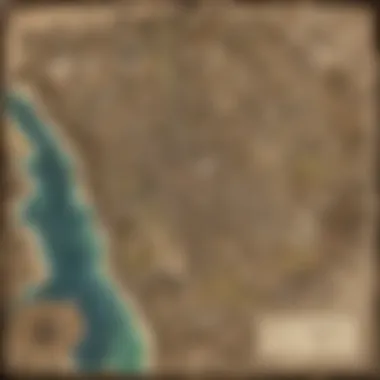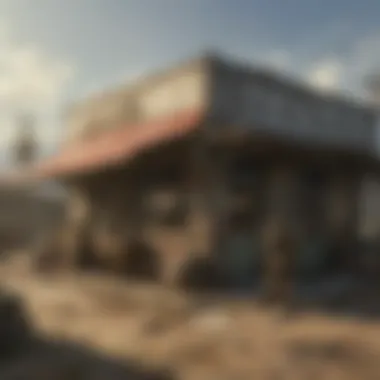Strategic Guide to Merchant Locations in Fallout


Intro
Navigating the wasteland of the Fallout universe often feels like walking a tightrope. The desolate landscapes and crumbled cities hold plenty of dangers, but within them lie opportunities that can change your fate. Merchants play a crucial role in this post-apocalyptic world, being the lifeline for trading vital resources and tools for survival. This guide digs into the different merchant locations and types within Fallout, so you can ace your trading game while exploring the fallout-ridden terrain.
In this article, we’ll cover historical insights about the Fallout universe, offer gameplay strategies for newcomers, and reveal ways to make the most out of your interactions with merchants. So, whether you're a fresh vault dweller or an old hand at navigating post-apocalyptic chaos, there's something here for everyone to gain from.
Preamble to Merchant Locations
The merchant locations throughout the Fallout universe are not merely random spots scattered across the wasteland; they are vital hubs where players can engage in a variety of transactions. The significance of understanding these trading posts cannot be overstated, as they play a crucial role in how players evolve their strategies and character builds within the games. Whether you're a greenhorn just starting your journey or a weathered traveler seeking to optimize your inventory, recognizing where to find merchants and what they offer can enhance your survival chances and overall experience.
- Facilitators of Progress: Merchant locations serve as facilitators for progress in the game. Resources can be scarce, and a good trade route can mean the difference between life and death. These spots often become the player's lifeline, providing essential supplies and gear.
- A Diverse Array of Goods: Each merchant offers a unique inventory. From weapons and armor to health items and crafting materials, the variety ensures that players can customize their gameplay style accordingly. Understanding the typical stock of each type of merchant allows players to plan their purchases efficiently.
- Strategic Planning and Exploration: Knowing where merchants are located encourages players to explore the world around them. The settlements, cities, and hidden spots often host vendors, leading players to discover new challenges and narrative arcs. This element of exploration is also tied to gaining valuable experience points, making it a win-win situation.
"In theSdesolate world of Fallout, the knowledgeable scavenger becomes the thriving trader."
Understanding the nuances of merchant locations also aids in grasping **Fallout's trade economy as a whole. Engaging with different merchants can help in evaluating the worth of goods in the wasteland, using both caps and barter trade tactics. This knowledge equips players with insight into crafting their own strategies when approaching trade, helping them get ahead in a brutal landscape. Overall, exploring merchant locations is a fundamental aspect of gameplay that fosters both engagement and systemic understanding within the Fallout universe.
Understanding Their Role in Gameplay
Merchant locations function as more than simple shops; they are integral components of the gameplay loop. Players often find themselves relying on these places for both essential goods and more specialized equipment that can alter the course of their journey.
- Resource Supply Line: Merchants provide essential resources that often influence game progression. Often, looming shortages of ammunition or healing items may compel players to head to the nearest merchant. This dynamic shapes the pacing and strategy of the gameplay, creating a rhythm between scavenging, trading, and battling.
- Character Development Catalyst: Engaging with merchants can also promote character development. The types of items a player chooses to purchase or barter for can directly influence their abilities and gameplay style. For instance, a player who heavily invests in melee weapons may choose to frequent a specific vendor known for selling high-quality bats and blades, while someone focused on ranged combat will seek out those offering guns and ammo.
In essence, merchants are a blast furnace for the shaping of player identity and strategy. They tie the narrative of survival directly to choices players make.
Overview of Fallout's Trade Economy
When delving into the trade economy of Fallout, it's clear that it reflects a chaotic blend of desperation and enterprise in a post-apocalyptic world. The economy is not as straightforward as the one players may know from their pre-war existence; it is characterized by a delicate balance of barter and caps-driven transactions.
- Caps as Currency: While caps serve as the primary currency, the barter system's importance cannot be marginalized. Players often find better deals through trading items rather than simply tossing caps at merchants. Knowing the worth of their loot can tip the scales in their favor.
- Dynamic Pricing: Prices vary based on a merchant's location and what they are selling. A merchant in a bustling city may have higher prices compared to one in a desolate area, reflecting supply and demand. Understanding this principle helps players make better purchasing decisions.
- Market Influence: Player actions can influence the economy subtly. For instance, flooding the market with weapons can lower their value, while scarcity can drive prices sky-high. This interaction not only deepens the engagement but also builds a sense of agency among players within the game world.
In summary, grasping the intricacies of Fallout's trade economy enhances players' understanding of why merchants are so significant. By navigating their needs through effective trading, players can bolster their arsenal and resources, preparing them for the many challenges that lie ahead.
Categories of Merchants
In the vast wasteland of the Fallout universe, merchants serve as vital lifelines, offering supplies, gear, and specialized services essential for survival. Understanding the categories of merchants enriches gameplay and enhances strategic planning. Each category brings its own unique strengths and offerings, allowing players to tailor their trading approach according to their specific needs and circumstances.
Players can benefit from recognizing the different types of merchants they may encounter, as it enables a more efficient trading experience. Whether seeking common supplies or rare items, knowing which merchant category to approach helps in maximizing resources, particularly in a treacherous environment where every cap counts.
General Traders
General traders are the backbone of trading in the Fallout world. These individuals typically run shops in various settlements and are stocked with a wide array of everyday items. You’ll find common weapons, ammunition, food supplies, and various odds and ends here. Their importance lies in the accessibility and variety they provide. Anytime you need to restock before heading into the wilderness, these merchants should be your first stop.
The inventory of general traders frequently includes:
- Basic weapons like pistols and rifles
- Simple armor and protective gear
- Food items such as Brahmin meat and Nuka-Cola
- Miscellaneous items like stimpaks and chems
Having general traders within reach allows for quick exchanges, making them indispensable in the post-apocalyptic landscape. Their prices generally remain consistent, and negotiations tend to be straightforward compared to other merchant types.
Specialty Vendors
Specialty vendors, as their name suggests, focus on particular product lines or themes. Be it drugs, weapons modification, or unique beverages, these merchants provide something specific that general traders might not carry. For instance, a vendor might specialize in selling rare chems that you can't find anywhere else, which can give you a significant edge in combat or crafting.
What sets specialty vendors apart include:
- Unique items and rare finds not available with general traders
- Special skills or knowledge, offering quests or additional resources
- Exclusive recipes for crafting that are crucial for building your character’s strengths
Locating these vendors can sometimes require a keen eye, as they might be tucked away in smaller settlements or even wandering the wasteland. Their specialized focus means investing in relationship-building with these characters can yield high rewards over time, as they often look favorably on repeat customers.
Craftsmen and Artisans
Craftsmen and artisans bring a unique dynamic to the trading experience in Fallout. These are the traders who not only sell items but also have the ability to enhance or create new tools and weapons. Whether you’re in search of a weapon modification or a completely new item, these skilled professionals are your best bet.
Craftsmen often have:


- Knowledge of crafting, which can lead to customized gear tailored to your play style
- A more complex inventory that includes crafting materials and plans for new items
- The ability to teach valuable skills that can be useful for specific crafting needs
Utilizing craftsmen effectively can significantly impact your gameplay. For example, obtaining enhanced weaponry from a blacksmith not only boosts combat readiness but can also change how you approach battles. By leveraging the crafting and enhancing capabilities of artisans, players can create a distinctive experience that suits their unique play style.
Each merchant category plays a critical role in shaping the overarching economic ecosystem within Fallout, directly affecting how players strategize their adventures in the expansive wasteland.
Key Merchant Locations Across Fallout Games
Merchant locations serve as crucial hubs for players seeking to refine their inventories, stock up on essentials, or offload surplus gear. In the expansive universe of Fallout, these locations not only provide access to items but also play a pivotal role in player engagement with the world. Understanding where to find these merchants can mean the difference between surviving the harsh wilderness and thriving in it. Players need to grasp the significance of these points of commerce—armed with knowledge, they can make more informed strategic decisions while navigating the wasteland.
Vault-Tec Locations
Vault-Tec facilities are like a double-edged sword for traders. While many may think of the vaults primarily as sheltered havens from the nuclear fallout, they also host some unlikely merchant opportunities. Inside these bunkers, players can sometimes find unique items, curated by the remnants of pre-war society. For instance, the abandoned vaults often contain rare crafting materials or even special weapons tied to old world technology.
Proximity to these locations can allow a player to get their hands on some hard-to-find items early in the game or restock on essentials after intense forays into the dangerous surface. However, these vaults often present their share of challenges—think feral ghouls lurking in the shadows or malfunctioning security systems that require your wits and firepower to get past. Gamers looking to explore vaults must tread carefully; sometimes the treasure may not be worth the risk to life and limb.
The Settlements
Settlements, a staple in any Fallout game, are often the heart of trading within the post-apocalyptic environment. From the makeshift camps of the common folk to well-fortified towns, each settlement carries its own vibe and set of available goods. Settlers often host general traders that provide basic necessities like food, water, and various types of armor and weapons. Here, players can experience the living tapestry of the game's world.
Interestingly, some settlements host specialty vendors. These niche traders sell goods tailored to specific needs—for instance, chem dealers with their potent cocktails or armorers with elaborate upgrades for gear. One can't overlook the sometimes-overlooked frequency of barter opportunities in these settings. Engaging effectively with settlement merchants can lead to significant gains, provided players keep an eye on each location’s stock, which varies significantly.
- Key examples of settlements include:
- Sanctuary Hills
- Diamond City
- The Castle
These locations often become focal points of player activity, embodying a blend of trading and community that enhances the Fallout experience.
Major Cities
Moving on to major cities—think Diamond City and New Vegas—these urban landscapes stand out as trading powerhouses ripe for exploration. Unlike the quaintness of settlements, cities are bustling with life and offer bustling markets where anything can be traded. They provide a greater variety in terms of items, with merchants displaying everything from rare weapons to powerful chems that can significantly impact gameplay. Busy streets form a mosaic of interactions, with traders vying for attention beside crowded stalls. The sheer scope of items available can be staggering.
In cities, technology and culture flourished even in the post-apocalyptic setting. Players can find shops selling not just goods, but also relevant lore and stories about the world before the nuclear fallout. For example, a merchant in New Vegas might share insights on pre-war history, giving players context that enriches their journey. On the flip side, while larger markets offer more variety, they also require a keener sense of negotiation; other players and computer-generated NPCs might force one to reconsider how to maximize trading potential.
Ultimately, major cities represent both opportunity and complexity in the trading system. The interactions in these spaces are interconnected with the ongoing narrative, making them essential areas to familiarize oneself with for any player looking to succeed in their Fallout journey.
"In the world of Fallout, knowing where to shop is as essential as knowing how to fight."
Establishing a network of trusted merchant locations broadens strategic capabilities, ensuring that players are always prepared for their next adventure.
Items Available from Merchants
Merchants in the Fallout universe serve as essential lifelines for players attempting to navigate the hostile, post-nuclear landscape. Understanding the variety and importance of items available from merchants is crucial for survival and progression. It’s not just about acquiring weapons or supplies; it’s about strategizing and preparing for what lies ahead. The choices made when trading can significantly influence a player’s experience.
Weapons and Armor
Weapons and armor are the bread and butter of survival in Fallout. With the constant threat from mutated creatures, hostile raiders, and the environment itself, having the right gear can make all the difference. Merchants stock a variety of weaponry and armor types. For instance, players can find everything from basic pipe guns to intricate energy weapons.
When evaluating options, consider the following:
- Durability: Investing in weapons and armor that can withstand wear and tear is vital. Some may have better resistance against particular damage types.
- Upgradability: Look for items that can be modified. Merchants often carry base models that can be customized with various mods found throughout the wasteland.
- Weight and Carrying Capacity: Heavier weapons may pack a punch but can slow you down. Balancing firepower and mobility can be a strategic advantage in tense situations.
Buffs and Chems
Buffs and chems are essential for pushing limits beyond normal capabilities. They can enhance health, stamina, and even attributes like strength or perception. Merchants often have a rotating stock of these items, which can be crucial during critical encounters or challenging quests.
Here’s what to keep in mind when trading:
- Duration and Side Effects: Each chem has its own benefits and risks. Understanding the duration can help gauge how to plan your strategies during missions.
- Mix and Match: Utilizing different buffs can complement each other effectively. Some players may find that stacking specific buffs can turn the tide of a battle.
- Costs: Some high-end chems can be pretty expensive. Always calculate if an item's benefits justify its cost in caps or bartering.
Crafting Materials
Crafting materials are the unsung heroes in the wasteland. They are crucial for crafting ammunition, upgrading equipment, and even constructing settlements. Merchants’ inventories may be sparse in these materials or may offer them at a premium, so understanding the demand and supply is important.


Consider this when dealing with crafting materials:
- Rarity: Some materials are harder to come by than others. Items like adhesive or aluminum can make or break a crafting project. Prioritize acquiring them when available.
- Trade-offs: Sometimes you might face a decision between a useful weapon and a batch of crafting components. It might pay to consider your current needs versus potential future projects.
- Combo Prowess: Some crafting options yield items that sell for a higher price than the individual components. This can turn into profitable ventures when executed correctly.
"In the wasteland, it’s not just about the items you own, but how well you understand them—make every trade count!"
By keeping a keen eye on the items available from merchants, players can optimize their gameplay. Each item purchased can lead to new strategies and approaches in the ever-challenging world of Fallout.
Trading Mechanics
Trading Mechanics play a crucial role in navigating the intricate web of merchant interactions within the Fallout universe. Understanding these mechanics not only influences how effectively players can acquire resources but also shapes their overall experience in the post-apocalyptic landscape. This section breaks down pivotal elements of trading, helping players make informed decisions in their journeys.
Bartering vs. Caps
The fundamental first choice facing players in trading is whether to barter or use caps. Caps are the primary currency circulating throughout the wasteland, allowing for straightforward transactions with merchants. Standard purchases generally include food, weapons, or mods for gear that enhance your capabilities.
Bartering, on the other hand, adds a layer of strategy not found in direct cap transactions. Players can trade items from their inventory that may be more valuable than their cap equivalents, such as rare weapons or crafting materials. This can be particularly useful when trying to maximize your returns. Keep in mind:
- Evaluate item worth: Not all items are created equal. A junk item you’ve collected over time might hold significant value for a merchant, so don’t shy away from sifting through your inventory.
- Merchant preferences: Some merchants might only accept bartering, making this strategy essential in certain situations. It might also be beneficial to discover what specific merchants favor doing trades instead of accepting caps, as it can lead to unexpected hidden gems.
Inventory Refresh Rates
One key consideration is how often merchant inventories refresh. Each merchant has a specific refresh rate—typically, this can range from 24 to 48 in-game hours. Knowing this helps players strategize their adventures. For instance, if you interact with a merchant, only to find the item you needed absent, you can aim to return after some time to check for new stocks.
The refresh mechanics mean:
- Plan your visits: If you’re hunting for a particular item, visiting the same merchant repeatedly will be an exercise in futility if you don’t time it right.
- Rotate your targets: By hitting up various merchants, you can check multiple inventories and keep your resources up to date.
By understanding refresh rates, you can outsmart the marketplace and ensure you have access to items when you need them.
Merchant Inventory Variability
Lastly, the variability in a merchant's inventory shapes the trade experience dramatically. Various factors influence what each merchant has at their disposal. Individual merchant types, their specialties, and even randomization algorithms affect what items you’ll find. For instance, a general trader in Sanctuary Hills will likely stock vastly different goods compared to a specialty vendor in Diamond City.
Some points to consider include:
- Merchant rarity: Rare items or specific types of armor might only appear when dealing with specialized vendors. Seek these out for limited-time opportunities.
- NPC quirks: Some vendors may have a particular focus, changing their stock based on your character's development and skills. Building relationships with these merchants may yield unique trades.
In summary, having a firm grasp of trading mechanics empowers players to make intelligent decisions that can significantly affect their overall gameplay experience. Shaping your approach to both bartering and caps, timing your visits wisely, and understanding the unpredictable nature of merchant stock can lead to a richer, more rewarding journey through the Fallout universe.
Merchant Behavior and Dynamics
Merchant behavior and dynamics play a crucial role in establishing the economy within the Fallout series. Understanding how merchants operate can give you, the player, a competitive edge. This section will delve into the intricate behaviors of merchants and how they affect trading and overall gameplay.
Restocking Patterns
Merchants in the Fallout universe do not operate on a simple supply and demand system. Instead, their restocking patterns are influenced by several factors, making it essential for players to understand how and when to interact with them. Some key elements of restocking include:
- Time-Based Refresh: Each merchant has a specific refresh rate. For instance, some may restock their inventory after 48 in-game hours, while others might take longer, perhaps up to a week. Keeping track of when merchants restock can help you make the most of your trading opportunities.
- Inventory Rotation: Not every merchant has a fixed inventory. Their stock changes based on various factors—like your character's level, the quests you've completed, or the settlements you've engaged with. This not-so-obvious aspect can lead to finding unique items that were previously unavailable.
- Supply and Demand: Occasionally, the items in high demand might influence what merchants restock. When you notice certain goods seem abundant, it could be a sign that players are offloading them, creating a cycle of scarcity and abundance. Being aware of these trends enhances your trading strategy.
Discovering the precise moments to visit merchants can vastly improve your store of weapons, armor, and special items. It’s like hitting a gold mine when you figure out their rhythm.
Interpersonal Reactions
The interactions with merchants in Fallout aren’t merely transactional. The way a player engages with them can trigger various interpersonal dynamics that may alter outcomes. Key aspects of these interpersonal reactions include:
- Player Reputation: Your standing in the world can affect how merchants treat you. For instance, if you consistently barter favorably, merchants might offer you better prices or special items as a reward for your loyalty. Conversely, if you've ruffled feathers, be ready to get deals that leave you feeling shortchanged.
- Dialogue Choices: Fallout is well-known for its rich storytelling and dialogues. Choosing the right dialogue options can enhance your relationship with merchants. Building friendships can lead to exclusive trades or reduced prices, making it worthwhile to pay attention to the subtleties of conversation.
- Local Events: Sometimes, merchant behavior can change based on in-game events. For instance, during a raid on a settlement, merchants may offer discounts to offload stock rather than face potential loss. Understanding and capitalizing on these local events can lead to lucrative trades.
Engaging with the merchants on a personal level—instead of treating them as mere vendors—injects a richer layer into the gameplay experience. You might find unexpected allies in the most unassuming places if you play your cards right.
"In the wasteland, every interaction can lead to opportunities or pitfalls. Knowing your merchants is just as important as knowing your weapons."
Keeping these points in your mind will not only enhance your trading experience but could lead to valuable items and advantageous trade-offs that you wouldn’t have otherwise encountered. With insight into merchant dynamics, you can engage the Fallout economy to your advantage.


Strategies for Effective Trading
Trading in the Fallout universe is as much about strategy as it is about goods. Effectively navigating the market can yield immense benefits, aiding not just in acquiring essential supplies but also in fine-tuning your character's development. Knowing how to maneuver through vendor exchanges can change your post-apocalyptic outlook from dire to fruitful. Here, we’ll dig into various tactics that can not only bolster your trading skills but also enhance your overall gameplay.
Understanding Market Trends
When you step into the shoes of a Wastelander, keeping a pulse on market trends should be one of your top priorities. This isn’t just about the shiny wares; it’s about recognizing what items are in demand and which ones are, frankly, about as popular as a radroach at a picnic. For instance, during certain quests or events, certain contraptions like Stimpaks or specific weapon mods might experience a surge in demand. Taking note of these fluctuations can lead to pivotal trade opportunities.
- When to Buy: Always pay attention to what is trending within your surroundings. This involves pondering recent events in quests and character interactions. A shopkeep's chatter can often hint at what adventurers are currently after.
- When to Sell: Identify when items are at their peak value. For example, if you've amassed several pre-war money stashes, selling them when demand spikes can yield hefty profits.
Moreover, some merchants specialize in crafting specific types of items, like chems or apparel. If you know what a particular merchant favors, you can align your trading strategy with their offerings. Gleaning insights from the environment and other NPC dialogues can provide treasures of information on changing trade landscapes.
Maximizing Trade Profit
Profitability in trading isn’t solely about getting the best deal at the outset; it’s a long-term game where maximizing returns is crucial. Here are strategic considerations to bolster your trading profits:
- Barter Wisely: Don’t just throw caps around willy-nilly. Offer bartered items that might be of higher sentimental or collectible value. Some vendors appreciate unique items over mere currency, and you can leverage that to nab bigger deals.
- Inventory Management: Keeping track of your own inventory is just as important as knowing what the vendors possess. If you have excess crafting materials or old gear you no longer need, hand them off—but only if you can negotiate a fair trade.
- Know Your Merchants: Different merchants have distinct biases towards certain items. For example, a chem dealer will be more amenable to trading for chems and healing items compared to a gun dealer who’s looking for ammo and weaponry.
- Consider Relationship Building: Establishing rapport with merchants can sometimes yield discounts or exclusive items. Certain quests often enhance your status with them, which can translate to better barter deals down the line.
"In the world of Fallout, every trade is a battle, and knowledge is your greatest weapon."
Impact of Merchants on Gameplay
In the Fallout series, merchants play a critical role that extends beyond simple exchange of goods. Their impact on gameplay is multifaceted, influencing not just the items players can procure, but also shaping how players approach challenges and develop their characters over time. The presence of merchants often signifies the first hints of civilization in an otherwise desolate landscape, thus tying the gameplay experience back to the underlying narrative of survival and community rebuilding.
Merchants serve various important functions, especially as players forge their paths through the wasteland. They're not just a stop for purchasing supplies; they act as hubs of information and local lore as well. Understanding the role of merchants can truly augment a player's experience:
- Acquisition of Resources: Merchants provide essential items, weapons, and crafting components that are crucial for survival.
- Character Progression: The items obtained from merchants directly influence how players build their characters, offering paths toward specialization or versatility.
- World-Building: Engaging with merchants often reveals snippets of the game’s backstory, enriching the overall narrative.
At the core of their significance lies an intricate balance between the economic and social systems within the game. These retailers not only facilitate trade but also create opportunities for players to explore diverse methods of character enhancement and strategic gameplay.
Enhancing Character Development
Character development in Fallout is heavily influenced by the strategic decisions players make regarding their interactions with merchants. The diversity of items offered, from combat gear to consumables, directly contributes to how players can tailor their character builds and playstyles. Each merchant location often has a unique inventory influenced by their locale or specialty.
This leads to some intriguing choices:
- Skill Enhancement: Players can focus on developing specific skills or perks based on items available, like investing in sneak skills if they can find stealth-related gear.
- Role-Playing Opportunities: Different merchants can invoke different motivations for trading—some may be friendly, while others might be more shady. This can guide role-playing choices.
- Economic Impact: Engaging in bartering can affect a player's resources, making for interesting moral and tactical dilemmas when deciding between necessary supplies and maintaining a trade economy.
With each interaction, players must think critically about how their choices will shape their avatar's identity in this fluidly reactive environment.
Modifying Gameplay Strategies
The way players approach gameplay is also transformed by the merchandising landscape. Having access to specific vendors can radically shift strategies and outcomes, requiring tactful planning and adaptability. Here are a few ways merchants contribute:
- Strategic Stockpiling: Players often scan merchant inventories to prepare for upcoming challenges, ensuring they have the right tools and resources at hand.
- Market Dynamics: Understanding supply and demand mechanics can lead to more beneficial trading, teaching players to play the economic game as well as the combat one.
- Resource Management: Players learn to manage their caps more effectively, deciding between immediate needs versus saving for higher-value items.
Merchants can thus be seen as partners in the quest for survival rather than mere transactional outlets. Their engagement often leads players to rethink their strategies, making for an enriched gaming experience.
"In refinement of trading strategies, one finds not only the thrill of the transaction but also a deeper connection to the world. Merchants become guides on the ethical tightrope of the wasteland."
Navigating the intricacies of trade leads players towards a greater understanding of not just their character's abilities, but also of the environments they inhabit. Thus, merchants, in their various forms, not only shape the supplies players have but also enhance the skills and strategies that define their experiences.
Epilogues
In the sprawling and unforgiving landscape of the Fallout universe, understanding the nuances of merchant locations ultimately shapes a player’s experience and success. The act of trading is not merely an exchange of goods but a strategic element that can elevate one’s survival prospects significantly. As the game progresses, merchants become more than just points of interest; they serve as allies, rivals, and often critical links to advancement in both the narrative and gameplay.
The Importance of Culminations in This Article
Reflecting on the discussions presented throughout this guide, several key elements stand out regarding merchant locations and their future impact:
- Strategic Resource Management: Players learn to identify and utilize merchants as hubs for gathering essential resources. This knowledge enables them to make informed decisions about when to purchase or trade items, thus optimizing their in-game economy.
- Adapting to Market Changes: As players navigate the wasteland, the awareness of market trends among merchants allows for responsive trading tactics, enhancing overall gameplay experience.
- Role in Character Development: Merchants provide crucial opportunities for character progression. By leveraging trade systems effectively, players can boost their skills and expand their inventory with powerful gear and useful items.
- Engagement with the Community: The future of merchant locations can also foster a sense of community among players, especially in multiplayer settings or forums. Sharing insights and tips about effective trade can create a collaborative environment.
The Future of Merchant Locations in Fallout
Looking ahead, the development of merchant locations and their roles is likely to evolve. With each new installment of the series, there are possibilities for introducing innovative trading mechanics and diverse merchant types. For instance, incorporating factors such as:
- Dynamic Pricing: Prices that fluctuate based on player actions or world events could mirror real-life economic principles, making trading more engaging.
- Expanded Merchant Interactions: Greater depth in merchant relationships could add layers of complexity, perhaps affecting quests or storylines, where merchants have their own backstories and motivations.
- Technological Integration: Future titles might leverage new technologies to enhance trading interfaces, perhaps creating virtual environments where trading feels more immersive.
Investing time in understanding the evolving nature of merchants will prove crucial as Fallout expands. Players who keep their ears to the ground about community insights will find themselves better prepared for whatever the next wasteland throws at them.
As the Fallout series progresses, the strategic importance of merchants in the gameplay calculus cannot be understated. Their locations, behaviors, and available items form a tapestry of opportunities that, when navigated astutely, can lead to remarkable achievements in the post-apocalyptic realm.







